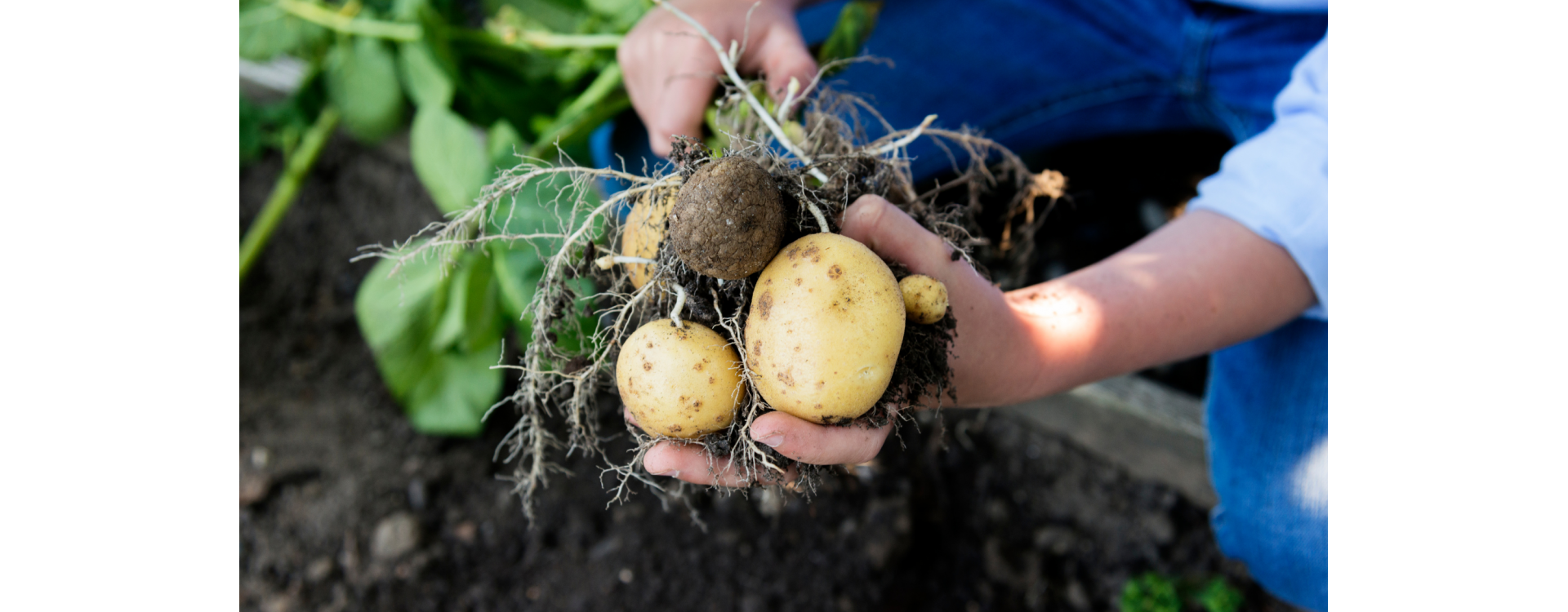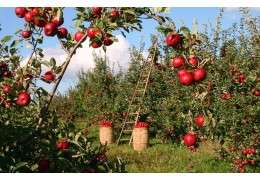06/23 - From the vegetable garden to the home garden
A garden gives you the wonderful opportunity to have access to fresh, healthy food at any time. By growing your own vegetables, herbs, and fruits, you can enjoy the satisfaction of harvesting them when they're at their peak ripeness and flavor. Additionally, garden-grown foods tend to be more nutritious, as they don't have to be harvested ahead of time to endure long travel and storage in stores. Having a garden at home allows you to experience a direct connection with the land and the food you eat, which can increase your appreciation for fresh ingredients and their positive impact on your well-being.
Growing a garden at home also gives you greater control over the food you eat. You can choose to grow your produce organically, without the use of pesticides or chemical fertilizers. This option is particularly valuable for those concerned about avoiding exposure to harmful chemicals and wanting to lead a healthier lifestyle. By growing your own food, you have the peace of mind of knowing exactly what's going into your dishes and can avoid the toxic residues often found in commercial produce. Additionally, by using sustainable growing methods, such as crop rotation and organic fertilizers, you can maintain soil health and promote biodiversity in your garden.
In addition to the health benefits, gardening encourages a more active and healthy lifestyle. The physical labor required to prepare the soil, plant, water, and care for plants is an excellent form of exercise. Spending time outdoors, connected to nature and the life cycle of plants, can be a therapeutic and relaxing experience. Growing a garden is an activity that allows you to disconnect from daily worries and immerse yourself in the world of gardening. Sharing this activity with friends and family can strengthen bonds and create special memories.
Gardening also promotes sustainability and environmental conservation. By growing your own food, you reduce dependence on resource-intensive agricultural products and the need for transportation to get it to your table. Furthermore, by avoiding the use of harmful chemicals, you contribute to the preservation of biodiversity and prevent soil and water pollution. You can use composting techniques to recycle plant waste and turn it into natural fertilizer for your garden, closing the nutrient cycle and reducing the amount of waste you generate. Furthermore, by growing a variety of plants in your garden, you can contribute to pollination and attract beneficial insects, such as bees and butterflies, which play a crucial role in plant fertilization and ecological balance.
No matter the size of your garden, there are always options for creating a vegetable garden. If you're short on space, you can opt for containers or pots, where you can grow herbs or small vegetables. Even a sunny balcony can be converted into a small urban garden, using vertical shelving or hanging planters on the wall. If you have a larger garden, you can design a traditional row garden or even incorporate raised beds for easier access and a tidy appearance.
In short, home gardens are a rewarding way to enjoy fresh, healthy, and sustainable food. Having a home garden gives you the opportunity to connect with nature, improve your physical and mental well-being, and contribute to environmental protection. By growing your own food, you develop practical skills, become an active part of your diet, and create a deeper connection with the land that sustains you. So don't hesitate to start your own garden and enjoy the many benefits it brings. Embark on this green adventure and discover the satisfaction of harvesting your own food in the comfort of your own garden!
More and more people are rediscovering the joy and benefits of growing their own food, transforming their patios, balconies, and terraces into beautiful green oases full of life and flavor.
This resurgence of the home gardening trend is attributed to a variety of factors. First, growing awareness of environmental issues and the importance of sustainability has led many people to seek healthier and more environmentally friendly alternatives for obtaining food. The idea of growing your own produce, without the use of pesticides and chemical fertilizers, is appealing to those who want greater control over what they consume and reduce their ecological footprint.
Furthermore, growing concerns about food safety and the quality of commercial foods have led to an increase in demand for safer and more nutritious options. By growing your own food, you can be sure you're getting fresh produce, free of toxic residues, and harvested at its peak ripeness. Home gardens allow for tastier and more nutritious foods, as commercial produce is often harvested early to withstand prolonged transportation and storage.
The trend for home gardening has also been driven by the desire to reconnect with nature in an increasingly urban and technological world. Gardening has become a way to escape daily stress and find peace and satisfaction in the earth and plants. Growing a home garden is a rewarding experience that allows you to enjoy the life cycle of plants, from sowing seeds to harvesting fruits, and provides the opportunity to engage in outdoor activities, in contact with the earth and under the sunlight.
The home garden trend has also been influenced by the growing awareness of the importance of healthy eating and the interest in home cooking. Home gardens provide a constant source of fresh, flavorful ingredients that can be used in delicious recipes. Nothing compares to the taste of a salad with freshly picked lettuce leaves or the intoxicating aroma of fresh herbs seasoning your dishes. Having a home garden allows you to experience a direct connection between the growing of food and its preparation, creating a more intimate relationship with what you eat and a greater appreciation for natural flavors.
In addition to the benefits for personal health and well-being, home gardens have also been shown to have a positive impact on the community and the local environment. Many neighborhoods are embracing the idea of community gardens, where residents come together to grow and share food. These spaces not only promote cooperation and a sense of community, but also contribute to food security and social inclusion by providing access to fresh food to those who might not be able to grow it at home.
The home garden trend has led to an incredible diversity of designs and growing techniques. From vertical wall gardens and indoor hydroponic systems to container gardens and balcony planters, the possibilities are endless. People are using creativity to adapt gardens to their available space, proving that you don't need a large area of land to enjoy the benefits of growing your own food.
Technology has also played a role in the rise of home gardening. There are apps and online tools that help amateur gardeners plan, monitor, and receive advice on caring for their crops. Advances in LED lighting and automated irrigation systems have made it possible to grow food year-round, even in challenging climates.
The trend of having a home garden has captured the imagination of many people looking for a healthier, more sustainable, and more connected way to obtain fresh food. The opportunity to grow their own produce, experience the life cycle of plants, and enjoy tasty and nutritious food has attracted people of all ages and experience levels. Whether it's the joy of gardening, a concern for food safety, or a desire to live a more conscious lifestyle, home gardens have become a trend that promotes health, well-being, and connection with nature.
So, if you have the space available at home, don't hesitate to join this exciting trend and grow your own food. Discover the joy of harvesting your own vegetables, herbs, and fruits, and sow the seeds for a healthier and more sustainable lifestyle. Your home garden will not only bring you personal satisfaction, but you'll also be part of a broader movement toward conscious eating and a closer relationship with nature.












Leave a comment